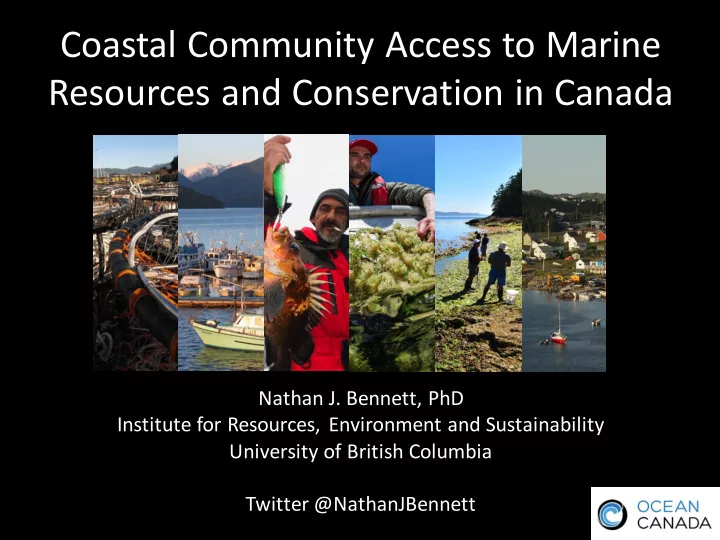

Coastal Community Access to Marine Resources and Conservation in Canada Nathan J. Bennett, PhD Institute for Resources, Environment and Sustainability University of British Columbia Twitter @NathanJBennett
Presentation Overview • Provide overview of OceanCanada Partnership • Introduce the Access Cross-Cutting Theme of the OceanCanada Partnership • Discuss the research plan and early results from the ongoing research
OceanCanada Partnership • 6 -year $2.5 million SSHRC Partnership Grant • PI: Dr. Rashid Sumaila (UBC IOF) • Central Question: How can Canada maintain healthy oceans and the well-being of coastal communities in the future? • Aim: Understand past, present and future of C anada’s oceans from an interdisciplinary perceptive • Three objectives For more information: 1. Taking stock 2. Scenario building http://www.oceancanada.org 3. Visioning
OceanCanada Partners
Working Groups and Themes NATIONAL : • Legal and policy working group; • Data and integrated scenarios working group; • Communications and engagement working group. REGIONAL: • Arctic working group; • Atlantic working group; • Pacific working group. CROSS-CUTTING THEMES: • Governance • Changing oceans • Access
Why a central focus on access? Credit: R. Sparrow
Access Cross-Cutting Theme Objectives • To define and characterize the importance of access for coastal communities in Canada • To understand the current status of and historical changes to access for coastal communities across the three coasts of Canada, and drivers of change in access • To examine the factors that support or undermine access • To identify knowledge gaps and develop an agenda for future research on access issues • To make recommendations for considering access in decision-making and policies related to the ocean
A mari usque ad mare?
So, how does one go about conducting research on access at national scale? The plan … Knowledge • Knowledge synthesis and co-production workshop Coproduction • Policy and literature review Workshop (complete) Interviews Across • Expert and stakeholder interviews on 3 coasts Canada (in progress) • Thematically driven and open coded analysis Community Case • Qualitative interviews and focus groups Studies (upcoming) • Synthetic and comparative analysis of cases Quantitative Surveys • Community surveys across the three coasts • Quantitative analysis of status, trends and determinants (need funding)
Research Methods Knowledge Co-Production Workshop (Complete) • Included 20 academics, practitioners, fishers and indigenous representatives from across Canada • Co-define the problem, identify issues, and set the research agenda Expert Interviews Across Canada (Analysis Underway) • With academics, practitioners, managers, government, indigenous reps. • Sample: 30 total, 10 on each coast (Pacific, Atlantic, Arctic) • Guided by open-ended questions related to objectives of Access CCT
(Bennett et al, 2018)
Access is “the ability to use and benefit from available marine resources or areas of the ocean or coast” (Bennett et al, 2018)
Use vs benefit Right to harvest Who benefits (Caught up in catch shares, Robertson et al, 2014)
Importance of access Community 1. Fundamental to community livelihoods and well-being 2. Declining vs thriving coastal communities 3. Indigenous rights Canadian Society 1. Urban-rural dynamics 2. Functioning food systems 3. Claims to sovereignty Environment 1. Coastal response capacity 2. Coastal stewardship and management capacity (Bennett et al, 2018)
Factors that Influence Access (Bennett et al, 2018)
Early insights from cross-country interviews • Fisheries rights and allocation are pressing concern on all coasts • General downward trend, but some exceptions • Historical and geographical factors have major influence on current access • Application of policies related to access at local levels is fluid and contested • Spatial access is an increasing concern • Loss of access is hard to reverse • Addressing access issues is necessary - requires knowledge, will, capacity and concrete action (Bennett & Bailey, in prep.)
Early insights on relationship between access and conservation Conservation ? Access
Bill C-68: An opportunity to address access issues in environmental decisions Bill C-68 • Traditional and community knowledge • Social, economic and cultural factors in the management of fisheries • Preservation and promotion of … commercial and inshore fisheries
Next Steps … Questions or Thoughts? http://nathanbennett.ca nathan.bennett@ubc.ca
Research challenge How can Canada promote healthy, ocean- related economies and communities without further degrading the marine environment? • Develop an enhanced understanding of the current and future social-ecological stressors affecting Canada ’ s three coastal- ocean regions (Climate change, ocean acidification, globalization, management innovations); • Effectively integrate social & natural science research in order to optimize national-level policy planning and management; • Work collaboratively towards a pan-Canadian vision for sustainable & healthy coastal-ocean regions by 2050.
Three objectives • Taking stock: – Integrate existing information from several disciplinary areas & identify gaps in our current knowledge. • Building scenarios: – Map future health of marine living resources under different biophysical and policy pathways; – Compare & ‘ground - truth’ our scenarios at local levels using case studies in each region. • Develop a shared vision: – Disseminate research findings to community stakeholders & the broader research community; – Engage with governments, industry, NGOS, & communities.
A small piece of the big OceanCanada picture… OceanCanada Partnership Pacific Atlantic Arctic Law & NDIS KM Policy Access Across scales Ocean Health Governance Community Wellbeing Changing Oceans
Accounting for Access in Ocean Policy • Key consideration across all ocean policy realms • Opportunity: Proposed amendments to the Fisheries Act • But … – Need will to implement. – Need adequate social science capacity. – Just transitions – Etc. (Bennett & Armitage, in prep.)
Recommend
More recommend